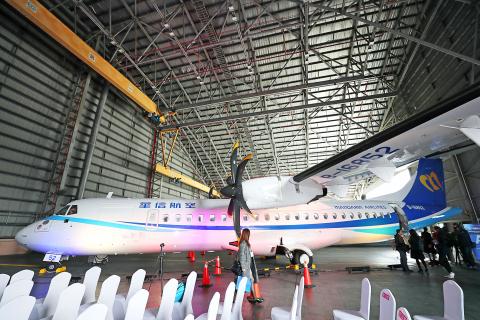Mandarin Airlines (華信航空), a subsidiary of China Airlines Ltd (CAL, 中華航空), yesterday inaugurated its new fleet of ATR 72-600 aircraft, in time for next month’s Lunar New Year holiday.
Two of the new aircraft have reached the fourth stage of the Civil Aeronautics Administration’s five-stage certification process, and the carrier is expected to deploy the airplanes for flights to the nation’s outlying islands and other domestic routes, Mandarin Airlines chairman Hsieh Shih-chien (謝世謙) said at the inauguration ceremony at Taipei International Airport (Songshan airport).
The new routes are to include daily flights between Kaohsiung and Penghu County’s Magong City; between Taichung and Hualien County; and between Taipei and Magong City, Hsieh said.

Photo: CNA
Mandarin Airlines plans to expand its ATR 72-600 fleet to nine aircraft before the end of 2020, Hsieh said.
The carrier took delivery of three aircraft at the end of last year, and expects to receive another two in June or July, he said.
Previously, the airline operated domestic routes with its fleet of Brazilian-made Embraer SA E190 twin-engine regional jets, which led to steep losses due to high fuel and operating costs, Hsieh said.
The new fleet allows the carrier to improve flight frequency to the outlying islands and other domestic destinations, he added.
The Embraer jets are designed for flights of between one-and-a-half hours and two hours, which is not ideal for domestic flights, as they average between 30 minutes and 40 minutes flight time, Hsieh said.
The ATR 72-600 are turboprops, which are ideal for short-haul flights and fuel efficiency, he said, adding that the aircraft also has lower emissions.
Although the airline is focused on improving its domestic routes, it would continue its international flights to cities in China, which are served by its fleet of Boeing Co 737-800 aircraft.
CAL chairman Ho Nuan-hsuan (何煖軒), who also attended the ceremony, said that the company has inked agreements with a number of foreign partners to improve pilot training and maintenance for the ATR 72-600.
CAL canceled plans to purchase ATR 72-600’s that were operated by now-defunct TransAsia Airways Corp (復興航空), because it declined to consent to in-depth inspections prior to sale, Ho said.
CAL has acquired TransAsia Airway’s hangar at Songshan airport to service the new fleet, he said.

CHIP RACE: Three years of overbroad export controls drove foreign competitors to pursue their own AI chips, and ‘cost US taxpayers billions of dollars,’ Nvidia said China has figured out the US strategy for allowing it to buy Nvidia Corp’s H200s and is rejecting the artificial intelligence (AI) chip in favor of domestically developed semiconductors, White House AI adviser David Sacks said, citing news reports. US President Donald Trump on Monday said that he would allow shipments of Nvidia’s H200 chips to China, part of an administration effort backed by Sacks to challenge Chinese tech champions such as Huawei Technologies Co (華為) by bringing US competition to their home market. On Friday, Sacks signaled that he was uncertain about whether that approach would work. “They’re rejecting our chips,” Sacks

NATIONAL SECURITY: Intel’s testing of ACM tools despite US government control ‘highlights egregious gaps in US technology protection policies,’ a former official said Chipmaker Intel Corp has tested chipmaking tools this year from a toolmaker with deep roots in China and two overseas units that were targeted by US sanctions, according to two sources with direct knowledge of the matter. Intel, which fended off calls for its CEO’s resignation from US President Donald Trump in August over his alleged ties to China, got the tools from ACM Research Inc, a Fremont, California-based producer of chipmaking equipment. Two of ACM’s units, based in Shanghai and South Korea, were among a number of firms barred last year from receiving US technology over claims they have

It is challenging to build infrastructure in much of Europe. Constrained budgets and polarized politics tend to undermine long-term projects, forcing officials to react to emergencies rather than plan for the future. Not in Austria. Today, the country is to officially open its Koralmbahn tunnel, the 5.9 billion euro (US$6.9 billion) centerpiece of a groundbreaking new railway that will eventually run from Poland’s Baltic coast to the Adriatic Sea, transforming travel within Austria and positioning the Alpine nation at the forefront of logistics in Europe. “It is Austria’s biggest socio-economic experiment in over a century,” said Eric Kirschner, an economist at Graz-based Joanneum

OPTION: Uber said it could provide higher pay for batch trips, if incentives for batching is not removed entirely, as the latter would force it to pass on the costs to consumers Uber Technologies Inc yesterday warned that proposed restrictions on batching orders and minimum wages could prompt a NT$20 delivery fee increase in Taiwan, as lower efficiency would drive up costs. Uber CEO Dara Khosrowshahi made the remarks yesterday during his visit to Taiwan. He is on a multileg trip to the region, which includes stops in South Korea and Japan. His visit coincided the release last month of the Ministry of Labor’s draft bill on the delivery sector, which aims to safeguard delivery workers’ rights and improve their welfare. The ministry set the minimum pay for local food delivery drivers at